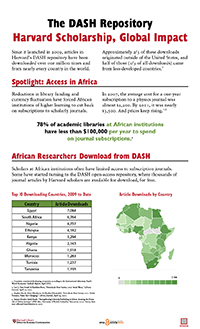Open Access Week 2012
From October 22 through October 28, Harvard University is joining hundreds of other institutions of higher learning to celebrate Open Access Week, a global event for the promotion of free, immediate online access to scholarly research.
Harvard will participate in OA Week locally by offering two public events that engage this year's theme, "Set the default to open access."

Events
On October 23rd at 12:30 p.m., the Berkman Center for Internet & Society and the Office for Scholarly Communication will host a forum entitled "How to Make Your Research Open Access (Whether You're at Harvard or Not)." OA advocates Peter Suber and Stuart Shieber will headline the session, answering questions on any aspect of open access and recommending concrete steps for making your work open access. The event will be held at Wasserstein Hall, Room 3019. The Berkman Center will also stream the discussion live online. See the Berkman Center website for more information and to RSVP.
On October 24, the Petrie-Flom Center for Health Law Policy, Biotechnology and Bioethics is hosting a panel of experts who will consider efforts by the National Institutes of Health to ensure public access to the published results of federally funded research. "Open Access to Health Research: Future Directions for the NIH Public Access Policy" will feature a discussion of the challenges and opportunities for increasing compliance with the NIH policy. The event, co-sponsored by the Petrie-Flom Center for Health Law Policy, Biotechnology and Bioethics, Office for Scholarly Communication, Right to Research Coalition, Universities Allied for Essential Medicines, and HLS Advocates for Human Rights, will be held at the Harvard Law School in Wasserstein Hall, room 3019. More information is available at the Petrie-Flom Center website.
Background
Harvard's OA Week events highlight the University's leadership in open access, a movement dedicated to transforming the traditional closed and costly system for the distribution of scholarly knowledge into one that opens the world of learning to people around the globe.
In 2008, Harvard's FAS faculty unanimously voted to implement a school-wide Open Access Policy—the first of its kind in the United States. Since then, six other Harvard schools have adopted open-access policies. Beyond our gates, the University's OA Policy has become a model for policies at institutions such as MIT, Stanford, and Duke.
Harvard continues to open its rich resources to the world in other ways. In April, the library made more than twelve million catalog records publicly available; these data offer both pragmatic opportunities and boundless potential for experimental applications. The Library Council has also spoken out on the unsustainable and restrictive nature of many major publishers' journal pricing structures, encouraging students, faculty, and library staff to participate more actively in open access efforts.
Harvard also champions openness in national policy, most recently by responding to the request for information concerning public access to research by the White House Office for Science and Technology and offering testimony about open access before a House subcommittee on Science, Space and Technology.
These efforts across Harvard are being undertaken to increase access to knowledge locally and globally. This year's OA Week events offer a unique opportunity to engage in reflection and discussion about how to open access to research.
DASH's Global Reach
During OA week, we're also celebrating the success of Digital Access to Scholarship at Harvard (DASH).Through the DASH repository, Harvard provides free, public access to scholarly articles by Harvard faculty and researchers.
Since it was launched in 2009, DASH has grown into a rich resource: at last count, the 8,500 works collected in DASH, representing knowledge from a variety of disciplines and schools, have been downloaded over one million times by readers from every continent on Earth.
Approximately 2/3 of article downloads originated outside the United States, and half of those (1/3 of all downloads) came from less-developed countries.
Download the poster below for more information about DASH's global impact, with a closer look at countries in Africa.

Data Sharing at Harvard
The University's Dataverse Network provides open access to the world's largest collection of social science research data.
